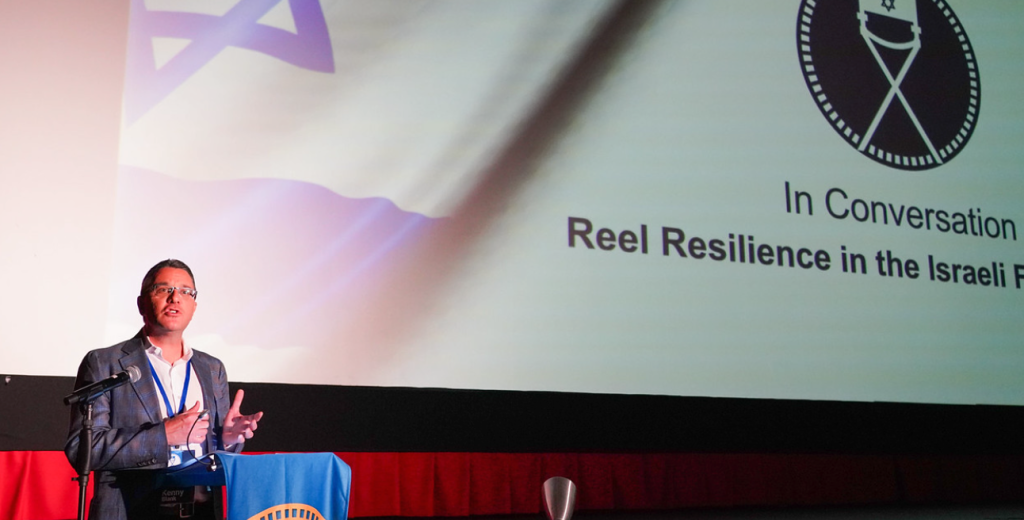The Atlanta Jewish Film Festival presented a powerful afternoon program at the Tara Theatre, “In Conversation – The Reel Resilience of the Israeli Film Industry.”
The Nov. 12 program captured some of the horrors and the hopes of the Israeli film industry following the tragedy of the Oct. 7 attack by Hamas.
A prominent feature of the Sunday afternoon program was a hastily edited trailer for a documentary about the massacre of participants in the Supernova Succoth music festival in Southern Israel in the early hours of Oct. 7. The documentary, which is still in the early stages of production, features scenes of the music festival in the hours before Hamas launched its horrific attack and during the attack itself.
Participants who had hidden themselves used their cell phones to record their fears and their hushed reactions to the murderous events that were taking place around them. The award-winning director of the film, Yariv Mozer, is still in the process of assembling the startling and sometimes extremely unsettling images that have been provided, in part, by the survivors of the attack.
At least 364 persons were killed and many more were wounded when Hamas terrorists opened fire on the open-air festival near Kibbutz Re’im, a little over three miles from the border between Gaza and Israel. Forty more were taken hostage.

Israeli filmmaker Yahav Winner died saving his wife and one-month-old son. His film, “The Boy,” was screened by AJFF.
Mozer rushed to the scene of the tragedy just two days after it occurred and was among the first to see firsthand the horrific results there. In the pre-recorded online discussion, prepared by the Festival for the Tara program, Mozer spoke of his shock about how such a tragedy could have occurred.
“How did we get to this point in which such a big surprise happened and where were we? And is it the fault only of the security people and the army? What is the consequences of having such a regime next to us for almost 20 years? This is a question that we must ask ourselves.”
Mozer won Israel’s most prestigious film award for his documentary six years ago about the last days of Israel’s first prime minister, David Ben-Gurion. His more recent production about the Nazi war criminal Adolf Eichmann was a Jury Prize nominee for best documentary at last year’s AJFF.
In addition to his production about the music festival, Mozer is working on a behind-the-scenes look at how Israel’s government is conducting the delicate negotiations for the release of the hostages in Gaza. He said he is dismayed by much of the reaction by the world to the result of the savagery that had occurred in Israel.
“We discovered that the world is not really believing us, which is shocking,” Mozer said. “We see the protests of people all around the world and in the Western world. I see the people that are ripping off the signs about the hostages in New York City, in London, in Paris, in America. How come? Who are those people? How come we do not get the full support of what Israel is doing now? Our enemy is Hamas. It’s not the Palestinian people.”
For Noa Regev, director of the Israel Film Fund, which encourages new productions, the challenge is how filmmakers in Israel can help shape public opinion in the world to what is happening today. Regev believes in that sense, Israel is at a critical moment in that process.
“The story about what happened on Oct. 7 is taking shape as we speak. And will it be a story of hate and darkness or hope and, of course, pain? And the cultural community in Israel plays a central part in shaping this narrative. And this is something that I think about a lot.”

The AJFF will feature films from Israel and more than 15 other countries at its 2024 festival.
The AJFF’s Tara Theatre program also screened the last film made by the young Israeli filmmaker, Yahav Winner, who lived in Kfar Aza, just across the border from Gaza. He died protecting his wife and their one-month-old infant during the attack by Hamas. His haunting 25-minute production, “The Boy,” captures in an eerily prescient way some of the tensions that have developed among those, who, like Winner, lived just beyond the fence that separated Israel from Gaza.
According to the AJFF, the organization is making a significant contribution to the filmmaker’s family and is inviting the community to join them. All of the money raised will go directly to the family. It’s all part of the AJFF’s goal to provide ongoing direct support to Israeli filmmakers during these challenging times.
The AJFF will showcase films from Israel and more than 15 other countries at its festival next year that begins on Feb. 13 and runs through March 7.
